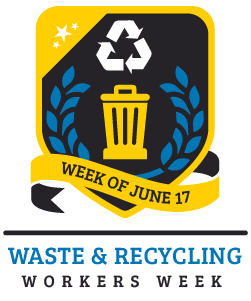Recycle Today For A Better Tomorrow! EDCO Can Help You Make a Difference.
There are many ways that recycling helps our environment and even the smallest step can have significant results. Recycling reduces the garbage placed in landfills and saves our precious resources from being used up. It almost always takes less energy to make a new product from recycled materials than it does to make it from new materials. Here are some facts that show how recycling can help conserve our natural resources.
AluminumDiscovered in the 1820s, aluminum is the most abundant metal on the planet. Americans throw away enough aluminum every three months to rebuild our country’s entire commercial air fleet. Nearly 120,000 cans are recycled every minute nationwide!
Aluminum cans can be recycled into new soda and beverage cans, pie plates, thumbtacks, aluminum foil and even license plates. An aluminum beverage can returns to the grocer’s shelf as a new, filled can in as little as 90 days after collection, re-melting, rolling, manufacturing and distribution. That means you could buy basically the same recycled aluminum can from a grocer’s shelf every 13 weeks, or 4 times a year. |
Glass
All newly purchased glass food jars contain at least 35% recycled glass. Since 1980, the average weight of a glass container has been reduced by more than 10%. Eight to twelve weeks is how long it takes for a glass container to be recycled and returned to the store shelf. One ceramic coffee mug alone in a truckload of glass is enough to contaminate the entire load and cause it to be rejected from recycling. Recycling one glass bottle causes 20% less air pollution and 50% less water pollution than when a new bottle is made from raw materials. The energy saved can run a 100-watt light bulb for four hours. |
PlasticThe PET bottle was patented by Nathaniel Wyeth in 1973. The first PET bottle was recycled in 1977. In 1960, a one-gallon plastic milk container weighed 120 grams. Today, it weighs just 65 grams.
Recycling 1 ton of PET containers can save 7.4 cubic yards of landfill space. Recycled PET can be used to make many new products, such as carpet, fabric for T-shirts, shoes, sweaters and coats, luggage, fiberfill for sleeping bags and even toys. |
PaperUsing old paper to make new paper uses 30 to 50% less energy than making paper from trees. Corrugated cardboard is recycled into new cardboard and cereal boxes. Newspaper can be recycled into egg cartons, game boards, new newspaper, gift boxes, animal bedding, insulation and packaging materials. Office paper is recycled into paper towels, tissue paper and toilet paper. Each of us uses approximately one 100-foot-tall Douglas fir tree in paper and wood products per year.
|
http://www.edcodisposal.com/corporate/edco-for-kids/fun-facts.htm






 Recycling one aluminum can saves enough energy to run a TV for three hours — or the equivalent of a half a gallon of gasoline
Recycling one aluminum can saves enough energy to run a TV for three hours — or the equivalent of a half a gallon of gasoline The oldest known examples of glass are Egyptian beads dating from 12,000 B.C.
The oldest known examples of glass are Egyptian beads dating from 12,000 B.C. Recycling 1 ton of plastic can save 1-2 thousand gallons of gas. Producing new plastic from recycled material uses only two-thirds of the energy required to manufacture it from raw materials
Recycling 1 ton of plastic can save 1-2 thousand gallons of gas. Producing new plastic from recycled material uses only two-thirds of the energy required to manufacture it from raw materials Every ton of paper recycled conserves 17 mature trees, 6,953 gallons of water, 463 gallons of oil, 587 pounds of air pollution, 3.06 cubic yards of landfill space, 4,077 kilowatt hours of energy. That’s enough energy to power the average American home for five hours!
Every ton of paper recycled conserves 17 mature trees, 6,953 gallons of water, 463 gallons of oil, 587 pounds of air pollution, 3.06 cubic yards of landfill space, 4,077 kilowatt hours of energy. That’s enough energy to power the average American home for five hours!


